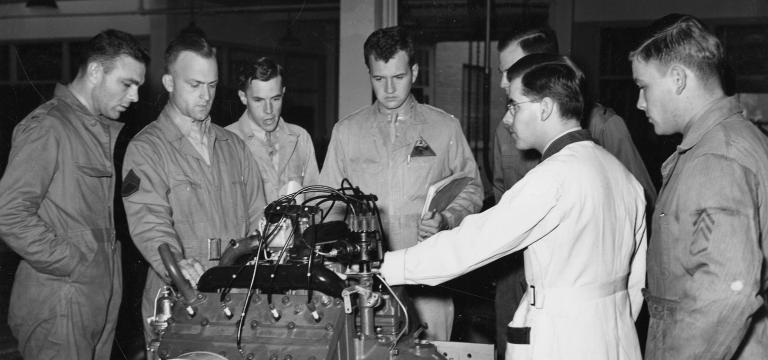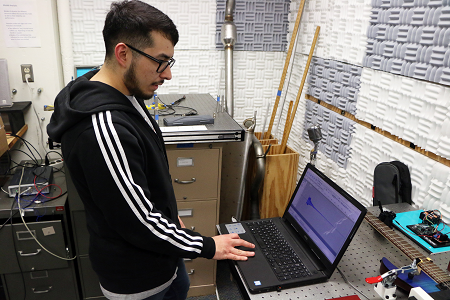
Kettering University graduates carry a storied and extraordinary heritage.
From its founding in 1919 to becoming General Motors Institute in 1932 and Kettering in 1998, it has graduated men and women who became captains of industry, entrepreneurs, venture capitalists, inventors, leading researchers, and much more. The co-op program was the cornerstone of their success.
Today, that program continues to be the envy of educational institutions around the world and gives its students a strong return on investment. Kettering ranked No. 1 in Michigan and the Midwest and 16th in the country for return on investment in PayScale.com’s 2019 study. On average, Kettering University graduates see a 20-year return on investment of $766,000.
“What makes Kettering unique is that it was founded on the notion that experience is not subordinate to the classroom,” said President Dr. Robert K. McMahan. “The theory and the practice are of equal weight and important in the growth of our students. Other schools do co-op as an add-on. We do it in a way that reflects our belief that they are of equal importance.”
GMI Grads Reflect on Co-op
General Motors and the university separated in 1982, but for the first 50 years, GMI’s robust co-op program was GM’s feeder system for engineering and executive talent. Many of those GMI students began and often ended their careers at the company, frequently in high-level positions.
Gary Cowger ’70 was one.
As a high school student in Kansas, engineering was not his first love. It was baseball, and he planned to go to Kansas State University to play. Then his mechanical drawing teacher and counselor saw another talent, stepped in, and suggested GMI.
“GM had a network across the country and had an in with high school advisors,” Cowger said.
In those days students had to find their own GM sponsor, and the competition was intense. According to Cowger, for every 20 people applying there was one opening.
He started at GMI in 1965 as a co-op at the Kansas City assembly plant and spent 45 years with the company. He held several senior positions, including president of GM North America, chairman of Opel, president of GM de Mexico, and group vice president of global manufacturing and labor relations.
“I owe a lot of where I ended up to co-op,” Cowger said, who also served as chairman of the Board of Trustees. “It provided the foundation. The advantage of being a GMI student was you learned how to work. You either made it or you didn’t. GM was creating its own crop of leaders.”
Other GMI graduates stayed with GM for a while and then took executive positions at other companies.
Bruce Coventry ’75 began his co-op career at GM’s Tonawanda engine plant in Buffalo, New York, and stayed with General Motors for 18 years before moving to leadership positions at Ford and Chrysler, including vice president of Powertrain Operations, and president of the company’s joint venture, Global Engine Manufacturing Alliance. He is now a consultant for start-up companies.
“Co-op was the best experience of my life,” Coventry said. “It taught me to learn from experience and made my education more clear. Co-op gives you the ability to balance the theoretical with the practical. That is essential. It helps you crystalize ideas.”
He started at the plant at age 17, but he couldn’t work on the plant floor until he turned 18. The delay gave him the opportunity to take a Dale Carnegie course, which was required for all supervisors in the plant. He was the only student in the class.
“That wouldn’t have happened at any other university,” said Coventry, who became a supervisor at 18.
Jacqui Dedo ’84 had already been accepted Cornell University when she heard about GMI. She applied and came for a tour of the university and the Cadillac assembly plant in Detroit, which would be her co-op. She was hooked.
“It captivated my interest and the idea that I could pay for my education on my own and could see what I could do with my life,” she said.
Dedo later moved on to Motorola where she held several executive roles and then became president of Timken’s Automotive Division. From there, she became senior vice president of strategy and business development at Dana Holding Corp.
“If I had to do it all over I would do it again,” she said. “Co-op teaches you how to learn and prioritize and gives you a good look at what it takes to be successful at what you are going to be doing for the next 40 or 50 years. Perhaps more importantly, you graduate with hundreds of friends focused on the technology industries, it’s an invaluable network.”
Today, like many Kettering graduates, she’s an entrepreneur and is the co-founder of Aware Mobility LLC, which focuses on connected and electrified vehicles.
Jane Boon ’90 started her co-op career at Magna in Canada. She found some of supervisors did not have an ambient understanding of the co-op program, so she had to teach them what was expected. It worked. Since it was a small program, Boon was in many meetings where decisions were made and her input solicited.
“I got to observe how managers manage one-on-one and in the board room and how they solicit ideas,” she said. “Being socialized in a workplace is a rich opportunity.”
Boon quickly understood companies want what Kettering delivers—people with big minds, not small minds.
Leaders of Tomorrow

Today, Kettering partners with more than 500 co-op sponsors ranging from major companies to startup and non-profits. When they graduate, they have 2.5 years of professional experience.
Kira Miller ’21, a Kettering student working on dual degrees in chemical engineering and biochemistry, is focused on products that support life-changing and life-saving research at Corning Life Science Division in Kennebunk, Maine.
She was given a special project to fix mistakes a supplier made in manufacturing a raw material. While the supplier had gone out of business and there was no way to work with them, she was confident she could do the job.
“The application required a lot of rework to make it useable for us,” Miller said. “I ran it. It worked great and the operators where able to use the stuff. It was my favorite project.”
Tanashki Frater ’22, an industrial engineering major from Jamaica, co-ops at Lear in Southfield, Michigan.
“Co-op prepares you for the real world,” Frater said. “Without that experience you wouldn’t know how work differs from being the classroom, and you learn it at an early age.”
Mikko Huotari ’22 is working on his mechanical engineering degree and spends his co-op time with the Magna Exterior Division in Troy, Michigan, working on plastic exterior panels for cars.
“The greatest part about co-op is the firsthand experience you get about your major,” he said. “If you don’t know what you want to do in life it is a great opportunity to find out rather than graduating with a major and finding out you don’t like it.
Huotari will work overseas at an operation in Germany in 2020 and plans to stay with Magna after he graduates.
He will start with a big leg up. He already has a 401K started with the company and will end up with no debt thanks to some tuition reimbursement and raises from Magna, scholarships, and help from his parents.
Kettering graduates earn an average starting annual salary of more than $60,000 and move up quickly, which helps most repay their debt in three years.
Co-op brings much more than dollars. It gives graduates a head start, a drive to succeed, an ongoing thirst for knowledge and wisdom, and an understanding of true leadership.
“A Kettering degree and its heritage are things students earn and own,” McMahan said.